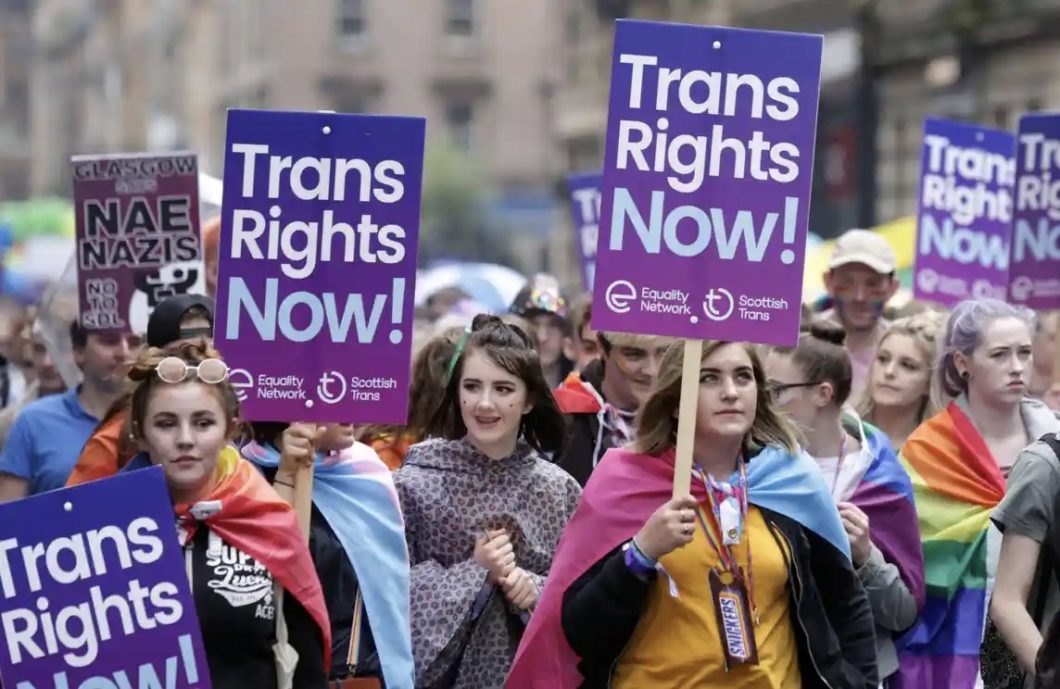26/01/2023
Scotland and Spain pass progressive transgender self-identification bills on the same day. Coach John looks at the issue.
Click HERE to download the Weekly English Practice as a PDF.
Useful Vocabulary
scrap: to remove sth
bill: a set of proposals debated in a parliament, which if a majority vote in favour of, becomes a law
applicant: a person who makes an official application for something
to warn: to give notice, advice, or intimation to (a person, group, etc.) of danger, impending evil, possible harm, or anything else unfavourable
blatantly: very obviously and noticeably in a bad way
to whip up: to excite; arouse eg people
homelessness: having no home or permanent place of residence
bullying: the act of bothering and/or hurting a smaller or weaker person
Listen to the audio and read the text
Scotland passes transgender self-identification bill
Scotland’s parliament has passed a bill that lowers the age for recognising transgender people from 18 to 16 and scraps a medical certification requirement.
The new law would allow anyone aged 18 or older to apply for a Gender Recognition Certificate without a medical certification if they have lived in their declared gender for three months, or six months if they are 16-18 years old.
Previously, applicants had to have identified as their chosen gender for two years minimum and would be given a three-month “reflection period” during which to reconsider their decision.
The new law was passed by 86 votes, with 39 votes against. Scotland is the first United Kingdom region to approve such a law, which already exists in countries such as Denmark, Argentina and Ireland. A similar bill was passed in the Spanish parliament with 188 votes in favour and 150 against.
Although Scotland has its own parliament and has democratically passed the new law, the Conservative UK Prime Minister, Rishi Sunak, has announced he will block the decision.
Nicola Sturgeon, the Scottish first minister, has warned the UK government against blocking gender legislation passed by the Scottish parliament, accusing ministers of “using trans people as a political weapon”.
Unfortunately, as in Spain, LGBTQ+phobia is being consciously and blatantly whipped up by the far-right in the so-called ‘culture wars’.
The right to self-identify is important, but it will not, in itself, solve the issues many trans people face. For example, trans people are discriminated against in the workplace. In the UK one in three employers said in a recent survey that they wouldn’t knowingly hire a trans person. Impact on job opportunities is linked with higher levels of poverty, as trans people may be forced into lower-paid jobs or face unemployment as a result.
This, along with transphobic family experiences, means that one in four trans people face homelessness at some point in their life. The majority of trans people report they experience bullying in education, both as students and as staff.
So, although the new laws passed in Scotland and Spain are a big step forward for trans people, there is still a long way to go to achieve total equality.
by ECP coach John Hird
Let’s chat about that
- What did the Scottish and Spanish parliaments recently do on the same day?
- What will be the main changes for transgender people under 18 if the laws are enacted?
- Can you explain what the ‘culture wars’ are? Give examples.
- Nicola Sturgeon could possibly be angry with Rishi Sunak. Why?
- Do you see any similarities between the situation in the UK and Spain regarding central government and regional parliaments?
- Talk about gender pronouns. Refer to the text on page 2.

